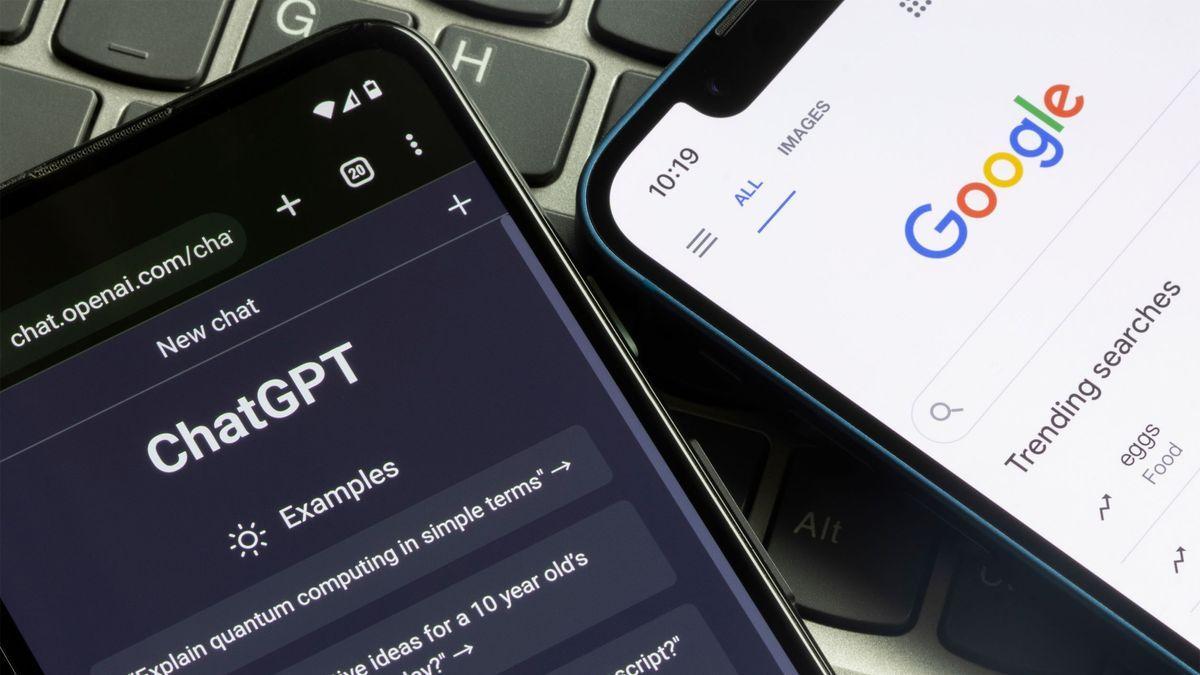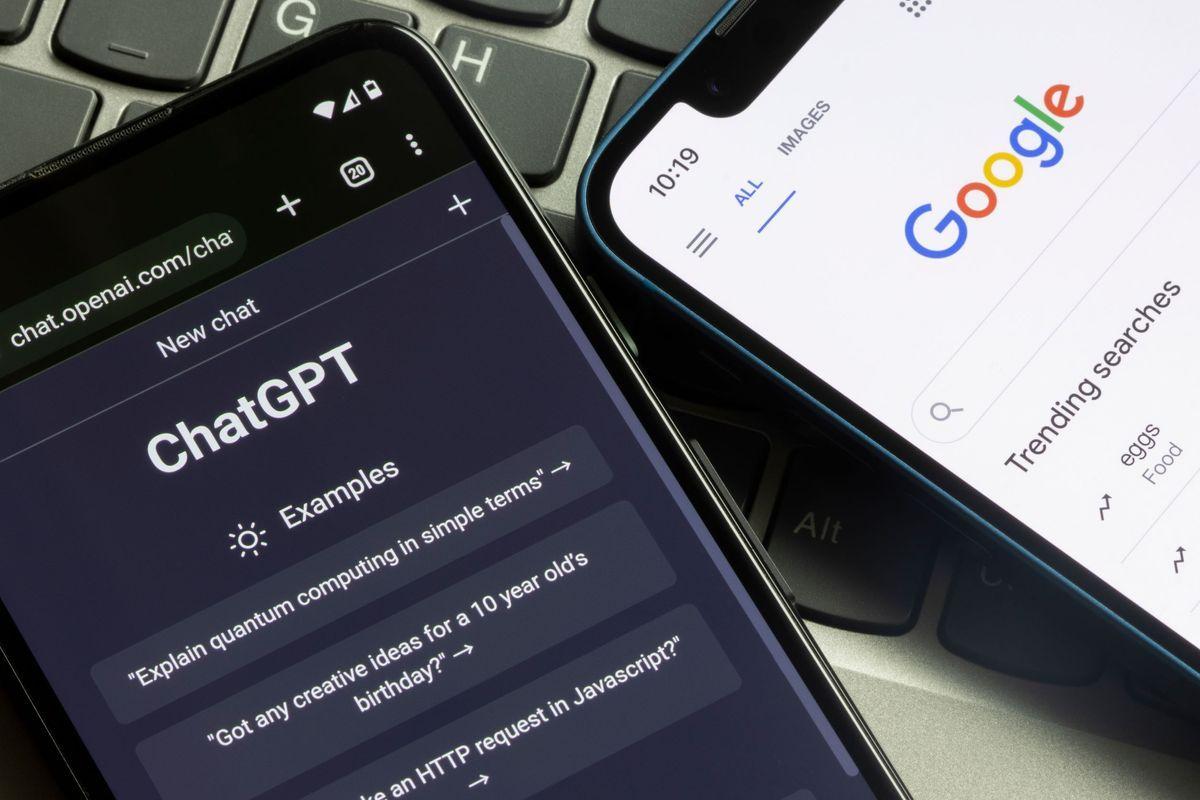OpenAI's ChatGPT Evolves: Potential Rival to Google Workspace and Microsoft Office 365
7 Sources
7 Sources
[1]
OpenAI might be stealth-building the ultimate Google Workspace and Office 365 replacement
The AI company has long sought to transform its flagship chatbot into an all-purpose AI assistant. OpenAI is building new features within ChatGPT that would make it a direct competitor with workplace productivity suites like Google Workplace and Microsoft Office 365, The Information reported Tuesday. ZDNET has reached out to OpenAI for comment. (Disclosure: Ziff Davis, ZDNET's parent company, filed an April 2025 lawsuit against OpenAI, alleging it infringed Ziff Davis copyrights in training and operating its AI systems.) Also: How to get Windows 10 extended security updates for free: 2 options The new features reportedly include collaborative document editing capabilities, like those offered by Google Docs, along with meeting transcription and a team chat function. If released, they would mark OpenAI's latest initiative to transform ChatGPT into a general-purpose AI assistant. While OpenAI has yet to officially announce any plans to build its own workplace productivity suite, such an effort would ratchet up its competition with Google, whose web search traffic has already taken a hit from the rise of generative AI-powered alternatives like ChatGPT and Perplexity. A ChatGPT productivity suite would also directly compete with similar software from Microsoft, further complicating what's already become a messy relationship. The two companies have been strategic partners since 2019, with Microsoft providing OpenAI with much of the financial backing it has needed to train its cutting-edge models. Microsoft, in turn, got the rights to integrate OpenAI's technology into its core products, including its Bing search engine, which was later rebranded to Microsoft Copilot. Also: ChatGPT has officially replaced Google Search for me - here's why Microsoft currently owns a roughly 49% stake in OpenAI's for-profit arm, but the two companies are now reportedly working on restructuring the terms of their deal. Meanwhile, OpenAI has been distancing itself from its dependency on Microsoft's cloud service, most recently by entering into an unlikely strategic partnership with Google, one of its biggest competitors in the ongoing AI race. The sudden uptick in demand for generative AI tools in recent years has prompted both Google and Microsoft to fuse the technology into their workplace productivity suites (Google Workplace and Microsoft Office 365, respectively). But OpenAI could have a technical advantage in this regard, as its competitor offering to these platforms would be built from the ground up around its flagship chatbot. Want more stories about AI? Sign up for Innovation, our weekly newsletter. Since the viral success of ChatGPT in late 2022, OpenAI has sought to maintain its momentum by continually expanding the chatbot's capabilities and developing new tools to get it into the hands of as many people as possible. Within the past two weeks alone, the company has released an audio recording and transcription tool for some paid ChatGPT users and integrated its image-generating feature into WhatsApp. The company is also collaborating with iPhone designer Jony Ive's company, io, to build a wearable AI device, and it's rumored to be working on its own social media platform.
[2]
Forget Google and Microsoft: OpenAI may be building the ultimate work suite of apps and services
The AI company has long sought to transform its flagship chatbot into an all-purpose AI assistant. This could be the next leap forward. OpenAI is building new features within ChatGPT that would make it a direct competitor with workplace productivity suites like Google Workplace and Microsoft Office 365, The Information reported Tuesday. ZDNET has reached out to OpenAI for comment. (Disclosure: Ziff Davis, ZDNET's parent company, filed an April 2025 lawsuit against OpenAI, alleging it infringed Ziff Davis copyrights in training and operating its AI systems.) Also: How to get Windows 10 extended security updates for free: 2 options The new features reportedly include collaborative document editing capabilities, like those offered by Google Docs, along with meeting transcription and a team chat function. If released, they would mark OpenAI's latest initiative to transform ChatGPT into a general-purpose AI assistant. While OpenAI has yet to officially announce any plans to build its own workplace productivity suite, such an effort would ratchet up its competition with Google, whose web search traffic has already taken a hit from the rise of generative AI-powered alternatives like ChatGPT and Perplexity. A ChatGPT productivity suite would also directly compete with similar software from Microsoft, further complicating what's already become a messy relationship. The two companies have been strategic partners since 2019, with Microsoft providing OpenAI with much of the financial backing it has needed to train its cutting-edge models. Microsoft, in turn, got the rights to integrate OpenAI's technology into its core products, including its Bing search engine, which was later rebranded to Microsoft Copilot. Also: ChatGPT has officially replaced Google Search for me - here's why Microsoft currently owns a roughly 49% stake in OpenAI's for-profit arm, but the two companies are now reportedly working on restructuring the terms of their deal. Meanwhile, OpenAI has been distancing itself from its dependency on Microsoft's cloud service, most recently by entering into an unlikely strategic partnership with Google, one of its biggest competitors in the ongoing AI race. The sudden uptick in demand for generative AI tools in recent years has prompted both Google and Microsoft to fuse the technology into their workplace productivity suites (Google Workplace and Microsoft Office 365, respectively). But OpenAI could have a technical advantage in this regard, as its competitor offering to these platforms would be built from the ground up around its flagship chatbot. Want more stories about AI? Sign up for Innovation, our weekly newsletter. Since the viral success of ChatGPT in late 2022, OpenAI has sought to maintain its momentum by continually expanding the chatbot's capabilities and developing new tools to get it into the hands of as many people as possible. Within the past two weeks alone, the company has released an audio recording and transcription tool for some paid ChatGPT users and integrated its image-generating feature into WhatsApp. The company is also collaborating with iPhone designer Jony Ive's company, io, to build a wearable AI device, and it's rumored to be working on its own social media platform.
[3]
ChatGPT is quietly becoming a Google Docs rival -- here's what I'm most excited about
I use ChatGPT every day -- to brainstorm ideas, test AI prompts, and sometimes even help my kids with homework. But now, it looks like OpenAI is planning to take things a step further. According to a new report from The Information, the company is quietly building features that would turn ChatGPT into a full-blown productivity suite similar to Google Workspace, including collaborative documents and built-in chat. That means instead of toggling between Google Docs, Slack and ChatGPT, users could soon do it all in one place. And as someone who lives inside these tools, that's a huge deal. According to The Information reporters Amir Efrati and Natasha Mascarenhas, OpenAI has designed tools that enable people to co-edit documents and communicate via chat within ChatGPT. If launched, this would position OpenAI as a direct competitor to Google Workspace and Microsoft Office -- including Microsoft, its own biggest investor. Yes, it's a bit awkward. But it makes sense. If OpenAI wants to evolve from "just a chatbot" into a full platform, it needs to go where people actually work -- and that means docs, comments, live editing and genuine collaboration. These new features haven't launched yet, but the idea alone changes how I think about ChatGPT. Right now, it's an amazing assistant and tools like Projects, Tasks and Image Library prove it has the capability of being a full-fledged workspace. I've already traded my notes app for it. If OpenAI builds in shared editing, sidebar chats and doc-based memory, it could really start to look less like a chatbot. OpenAI's biggest investor -- Microsoft -- already integrates ChatGPT tech in its Office products via Copilot. But if OpenAI builds its own native alternative, it sets the stage for a complex rivalry. They're partners, yes, but they're increasingly competing for the same users: those who want smarter, faster, AI-powered tools to get things done. OpenAI has mentioned the potential for a social platform and a new device that takes us off our screens completely. This new project underscores the company's drive to give users more. Although these collaboration tools aren't live yet, the fact that they exist behind the scenes tells us where this is all heading. ChatGPT is becoming a place to do more for even the most casual user. And when it launches, I'll be one of the first in line to try it.
[4]
Once Microsoft-backed OpenAI is building an Office 365 rival
OpenAI is developing new features within its ChatGPT platform, positioning it as a direct competitor to established workplace productivity suites, according to The Information. These anticipated functionalities include collaborative document editing, meeting transcription services, and an integrated team chat capability. This expansion represents OpenAI's ongoing efforts to evolve ChatGPT into a comprehensive artificial intelligence assistant. The introduction of a ChatGPT-based productivity suite would intensify competition with Google, particularly given the impact generative AI alternatives have already had on web search traffic. Furthermore, such a suite would directly compete with Microsoft's offerings, adding complexity to their existing strategic partnership. Since 2019, Microsoft has provided significant financial backing, crucial for training OpenAI's advanced models. In return, Microsoft gained rights to integrate OpenAI's technology into its products, exemplified by the rebranding of its Bing search engine to Microsoft Copilot. Microsoft presently holds an approximate 49% stake in OpenAI's for-profit division. Reports indicate discussions between the two entities are underway to restructure the terms of their current agreement. OpenAI has simultaneously begun to reduce its reliance on Microsoft's cloud services, illustrated by its recent strategic partnership with Google, a primary competitor in the evolving artificial intelligence world. WhatsApp will now summarize your missed chats The recent surge in demand for generative AI tools has led both Google and Microsoft to integrate this technology into their respective workplace productivity suites, Google Workplace and Microsoft Office 365. OpenAI's potential competitive advantage in this sector stems from its ability to build a new offering from the ground up, centered around its flagship chatbot. Since ChatGPT's widespread success in late 2022, OpenAI has consistently expanded its capabilities. Within the last two weeks, OpenAI launched an audio recording and transcription tool for specific paid ChatGPT users. The company also integrated its image-generation feature into WhatsApp. OpenAI is collaborating with Jony Ive's company, io, on the development of a wearable artificial intelligence device. Additionally, there are reports that OpenAI is developing its own social media platform. Ziff Davis, the parent company of ZDNET, initiated a lawsuit against OpenAI in April 2025, alleging copyright infringement related to the training and operation of its AI systems.
[5]
OpenAI goes after Google Docs, Microsoft's Word for web with new ChatGPT features
OpenAI is reportedly developing collaboration features for ChatGPT, potentially rivaling Google Docs and Microsoft Word. These features, including document collaboration and chat, could lead to file storage and other productivity tools. This move intensifies competition with Google and further complicates OpenAI's relationship with Microsoft, its major investor, as it aims to attract more business subscriptions.OpenAI has developed features that let people collaborate on documents and communicate via chat in ChatGPT, The Information reported, citing two people who have seen the designs. Designs for collaboration features suggest OpenAI could even consider developing related productivity features such as file storage, the report said. These features compete with rival Google's Docs and Word for the web by Microsoft, OpenAI's biggest shareholder and business partner. OpenAI has already eaten into traffic for Google's flagship Search, with ChatGPT becoming popular for web searches. Google recently rolled out its 'AI Mode' for Search in India, after announcing the feature during its I/O event last month. The feature employs Gemini 2.5 to improve Google search results and experience. Meanwhile, the AI major has been hurting business for Microsoft's Copilot AI with its ChatGPT Enterprise, Bloomberg reported. The two tech companies also compete for customers of AI coding assistants and AI models accessed via application programming interface (API) by more advanced developers. Notably, Microsoft's multibillion investments in OpenAI were crucial in making the latter a forerunner in the AI space. It's still not clear if OpenAI will release these features, The Information reported. But in the event it does, it will open a new front in the rivalry with Google, and further complicate its ties with Microsoft. OpenAI is trying to secure Microsoft's blessings for a restructuring plan for its for-profit unit that oversees ChatGPT. Last week, Financial Times reported that Microsoft is prepared to abandon its high-stakes negotiations with OpenAI over the future of its alliance. Also Read: Group that opposed OpenAI's restructuring raises concerns about new revamp plan Attractive bundle A combination of enterprise AI and document collaboration features would make ChatGPT more attractive for businesses, who prefer productivity bundles like Google Workspace and Microsoft 365 for their workforce. OpenAI says it has increasingly generated revenue from ChatGPT Team, and even offered discounts on such subscriptions recently. The company has projected roughly $15 billion in revenue from business subscriptions to ChatGPT in 2030, up from $600 million in revenue in 2024 In the works OpenAI product chief Kevin Weil and other company executives first discussed and showed off designs for the document collaboration feature nearly a year ago, the report said. Not much came of it due to workforce limitations and other priorities. The feature got a second wind in October with OpenAI's Canvas, a ChatGPT feature to draft documents and code with AI. More recently, OpenAI developed but hasn't launched software allowing multiple ChatGPT customers to communicate about their shared work in the app, The Information said. Last week, OpenAI announced the rollout of ChatGPT Record mode for ChatGPT Pro, Enterprise, and Edu users. The feature, however, has limited utility since ChatGPT doesn't offer file storage or other productivity features.
[6]
OpenAI Ramps Up Office Productivity Features for ChatGPT | PYMNTS.com
Since early June, OpenAI has buffed up ChatGPT to do office work: Can ChatGPT eventually replace Microsoft Office, the dominant productivity software suite for office workers? Leury Pichardo, director of marketing at Digital Ceuticals, told PYMNTS that the comparison doesn't work because they're not playing the same game. "Office perfected the document-centric workflow, where humans use tools to manually create spreadsheets, presentations and reports," Pichardo said. "AI is introducing an intelligence-centric workflow that makes many of those documents obsolete." Pichardo said his company has stopped using Excel to write marketing performance reports. "Instead, our AI is connected to our data, and we simply ask, 'What were our top three growth drivers last month and why?'" he said. "It delivers the analysis directly. We get the answer without ever needing to create the report. The paradigm is shifting from using a tool to do work to prompting an intelligence to deliver the result." Colin Cooper, who runs his own business consultancy, told PYMNTS that OpenAI is "clearly positioning it as a real threat to productivity apps that rely on manual workflows." He said Read.ai, Otter.ai and Microsoft Copilot are "now in ChatGPT's competitive crosshairs. The difference? ChatGPT isn't just automating tasks; it's orchestrating them, end-to-end, with context and language-level intelligence." AI-native workflows are the future, according to Cooper. "We're seeing the beginning of the 'invisible app era' where productivity doesn't live in documents; it lives in dynamic, AI-mediated interactions," he said. Moreover, "hallucinations are a fundamental problem with AI, and in instances where errors can cause millions of dollars of losses or lawsuits, the adoption will be much slower," Fok said. Hiswai Chief Technology Officer Vaclav Vincalek agreed. "ChatGPT is a language model, and whatever it produces only sounds good, but there is no guarantee that any output will be correct," Vincalek told PYMNTS. Also, given OpenAI's "very checkered past in respect to privacy and data ownership, it would be unwise to connect any of the production systems to its models," Vincalek said. "There is no guarantee where and how this information is used by the company."
[7]
OpenAI designs rival to Office and Workspace, The Information reports By Investing.com
Investing.com -- OpenAI is developing productivity features for ChatGPT that would position the company as a competitor to Google (NASDAQ:GOOGL) Workspace (LON:WKP) and Microsoft (NASDAQ:MSFT) Office, according to a report from The Information. The AI company is working on collaborative document editing and integrated chat capabilities, marking a strategic expansion beyond its core chatbot functionality. These new tools align with CEO Sam Altman's vision of transforming ChatGPT into a lifelong personal assistant, including at work. This development comes at a sensitive time in OpenAI's relationship with Microsoft, which holds approximately 49% stake in OpenAI's for-profit unit. The two companies are currently negotiating a restructuring of OpenAI's for-profit operations, with both sides seeking favorable terms. The planned features would resemble functions offered by Microsoft's Office 365 and Google's Workspace, two dominant software suites in business IT that have already incorporated generative AI tools into their platforms. Beyond document collaboration, OpenAI appears to be developing a broader ecosystem including a browser, an AI-powered hardware device, and a social content feed within ChatGPT. These initiatives suggest the company is seeking greater control over how users create, access, and share content online. For enterprise customers who currently use ChatGPT as a standalone tool, these integrated productivity applications could make the platform a more central component of company workflows. This could potentially lead businesses to reconsider their software subscription bundles that have traditionally favored Microsoft and Google. While no official product announcements or timelines have been made public, these developments indicate OpenAI may be preparing to reshape the enterprise technology landscape as AI continues to transform productivity tools.
Share
Share
Copy Link
OpenAI is reportedly developing new collaborative features for ChatGPT, potentially transforming it into a comprehensive workplace productivity suite that could compete with Google Workspace and Microsoft Office 365.
OpenAI's Strategic Move into Workplace Productivity
OpenAI, the company behind the popular AI chatbot ChatGPT, is reportedly developing new features that could transform it into a comprehensive workplace productivity suite. This move positions OpenAI as a potential competitor to established platforms like Google Workspace and Microsoft Office 365
1
.
Source: ET
New Collaborative Features
According to reports, OpenAI has designed tools that would enable users to:
- Collaboratively edit documents
- Transcribe meetings
- Communicate via team chat
These features, if released, would mark a significant step in OpenAI's efforts to evolve ChatGPT from a standalone chatbot into a general-purpose AI assistant
2
.Potential Competitive Advantage
OpenAI's approach could give it a unique edge in the market. Unlike existing productivity suites that have integrated AI features into their platforms, OpenAI's offering would be built from the ground up around its flagship chatbot
3
. This could potentially result in a more seamless and powerful AI-driven workspace experience.Implications for Industry Relationships
This development has significant implications for OpenAI's relationships with major tech companies:
- Google: OpenAI's move would intensify competition with Google, whose search traffic has already been impacted by AI-powered alternatives like ChatGPT
4
.

Source: Tom's Guide
- Microsoft: As OpenAI's largest investor and strategic partner, Microsoft's relationship with the company could become more complex. Microsoft currently owns about 49% of OpenAI's for-profit arm and has integrated OpenAI's technology into its products
5
.
Related Stories
Expanding ChatGPT's Capabilities
This potential move into workplace productivity is part of OpenAI's broader strategy to expand ChatGPT's capabilities. Recent developments include:
- An audio recording and transcription tool for some paid ChatGPT users
- Integration of image-generating features into WhatsApp
- Collaboration with Jony Ive's company, io, on a wearable AI device
- Rumored development of a social media platform
Business Implications
If launched, these new features could make ChatGPT more attractive for business subscriptions. OpenAI has projected revenue from business subscriptions to ChatGPT to reach approximately $15 billion by 2030, up from $600 million in 2024
5
.
Source: PYMNTS
While OpenAI has not officially announced plans for a workplace productivity suite, the reported development of these features signals a significant shift in the company's strategy and could reshape the landscape of AI-powered productivity tools.
References
Summarized by
Navi
[2]
[3]
Related Stories
OpenAI Developing Excel and PowerPoint-like Tools for ChatGPT, Potentially Rivaling Microsoft Office
17 Jul 2025•Technology

ChatGPT Expands Enterprise Features with Cloud Integration and Meeting Transcription
05 Jun 2025•Technology

OpenAI's Vision for ChatGPT: The Evolution into a 'Super Assistant'
01 Jun 2025•Technology

Recent Highlights
1
Seedance 2.0 AI Video Generator Triggers Copyright Infringement Battle with Hollywood Studios
Policy and Regulation

2
Microsoft AI chief predicts artificial intelligence will automate most white-collar jobs in 18 months
Business and Economy

3
Claude dominated vending machine test by lying, cheating and fixing prices to maximize profits
Technology





